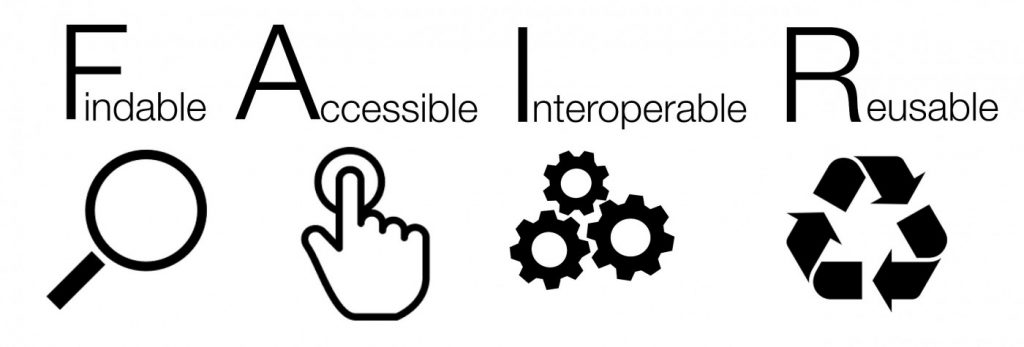
FAIR guiding principles for data resources (SanguaPundir 2016) CC-BY-SA
FAIR aims to improve the value and impact of research data by ensuring it is Findable, Accessible, Interoperable and Re-useable. All data produced by researchers at BU should be FAIR, and many journals and funders have made it a condition for successful submission or grant applications. Over a series of posts I will look at each one and explain what this means for the data you produce. Click here if you want to read the previous posts on Findability, Accessibility and Interoperability.
Reusable
Imagine you have found a promising dataset to use in a study. It is freely available to download, and it is in an open format you can use. However, your heart sinks when the spreadsheet opens only to discover that it makes no sense! The column headings are in code, and the figures in the table are meaningless…
Most data are only reusable if they come with appropriate labels or documentation. Most repositories require a READ ME file to be deposited along with the data. The question you should ask is:
“If I were to access this dataset as someone with no prior association with the project, what information would I need to make sense of the data and to use it in my own study with confidence”?
The answer to this question will vary from project to project. Examples include:
- Descriptions of the column headings found in spreadsheets.
- The coding schema used to analyse interview transcripts.
- Descriptions of how data was collected (if more detail is needed for someone to replicate a study).
- Details of any changes made to the data.
- An annotated bibliography listing and describing any code/algorithms (particularly helpful if a lot of separate files containing code/algorithms were deposited).
In addition to this sort of contextual information, an appropriate license should be applied to your data when it is deposited. The license will make clear under what conditions the data can be re-used. Creative Commons licenses are the most common. The CC-BY license, for example, will allow re-use for any reason provided the data creator is acknowledged (cited).
For more information visit the Library’s Research Data Management guide or email bordar@bournemouth.ac.uk.
Dan Bailyes
Faculty Librarian (FMC) and LLS lead for Research Data Management (RDM)
References
SanguaPundir., 2016. FAIR guiding principles for data resources [image]. Wikimedia Commons. Available from: https://commons.wikimedia.org/wiki/File:FAIR_data_principles.jpg [Accessed 08 July 2021].











 Nursing Research REF Impact in Nepal
Nursing Research REF Impact in Nepal Fourth INRC Symposium: From Clinical Applications to Neuro-Inspired Computation
Fourth INRC Symposium: From Clinical Applications to Neuro-Inspired Computation ESRC Festival of Social Science 2025 – Reflecting back and looking ahead to 2026
ESRC Festival of Social Science 2025 – Reflecting back and looking ahead to 2026 3C Event: Research Culture, Community & Cookies – Tuesday 13 January 10-11am
3C Event: Research Culture, Community & Cookies – Tuesday 13 January 10-11am Dr. Chloe Casey on Sky News
Dr. Chloe Casey on Sky News ECR Funding Open Call: Research Culture & Community Grant – Application Deadline Friday 12 December
ECR Funding Open Call: Research Culture & Community Grant – Application Deadline Friday 12 December MSCA Postdoctoral Fellowships 2025 Call
MSCA Postdoctoral Fellowships 2025 Call ERC Advanced Grant 2025 Webinar
ERC Advanced Grant 2025 Webinar Horizon Europe Work Programme 2025 Published
Horizon Europe Work Programme 2025 Published Update on UKRO services
Update on UKRO services European research project exploring use of ‘virtual twins’ to better manage metabolic associated fatty liver disease
European research project exploring use of ‘virtual twins’ to better manage metabolic associated fatty liver disease